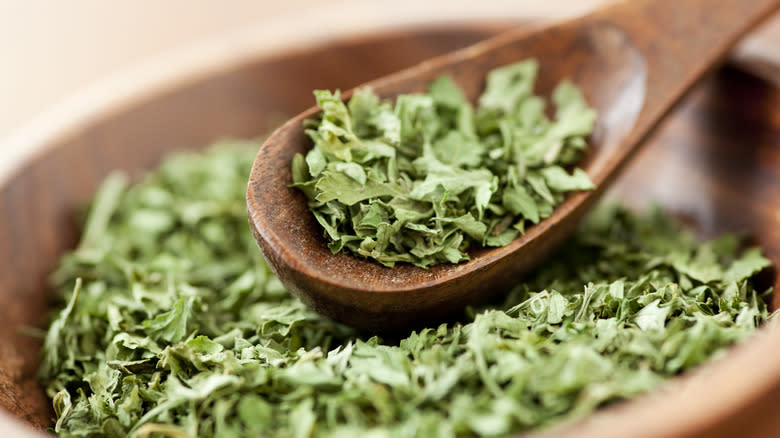The Major Seasoning Mistake You're Making With Pasta Sauce

A homemade pasta sauce is a joy, whether it's a quick cacio e pepe whipped up in minutes, or a slow-simmered spaghetti sauce given hours of care and careful seasoning. Combined with your favorite pasta shape, and blanketed in a cheese of choice, it's the star of any dinner party, as much as a comforting weeknight dinner.
But when it comes to getting the flavor of that pasta sauce just right, it's all too easy to stumble — and choosing the right seasoning is key to getting the best out of the ingredients. Instead of reaching for an all-purpose Italian seasoning, you should consider using individual herbs that suit the pasta sauce you're cooking up.
Despite the name, and its implied convenience, Italian seasoning's blend of basil, thyme, oregano, parsley, and sometimes even garlic or chilli, just doesn't work for every pasta sauce. The herbs can clash with the other ingredients, and even with each other. Using a selection of your own choice instead, whether fresh herbs, dried herbs, or both, will give you more control over flavor and can elevate any plate of pasta to the next level.
Read more: French Cooking Tricks You Need In Your Life
Fresh Herbs Aren't Always The Best Italian Seasoning Substitute

Staying away from Italian seasoning doesn't mean always using fresh herbs instead of dried herbs. Just as a verdant, grassy pesto or a no-cook tomato sauce need the color and flavor of fresh basil, ragùs like bolognese or other spaghetti sauces are best served by the mellow potential of dried herbs.
Having been dehydrated, dried herbs need the heat and moisture of a bubbling sauce to give up all of their delicious flavor — much like you would soak a dried chile in hot water before using it. This means that they benefit from slow cooking, and should be added as early as possible in the cooking process.
Using individual dried herbs like oregano, parsley, basil, or marjoram in these kinds of pasta sauces can help you dictate the final flavor profile more easily than a seasoning blend, as well as provide a world of variations to explore when cooking. Make a marinara one week with earthy, floral oregano, then compare it to the more bracing basil to find a favorite. And don't forget those fresh, tender herbs entirely either. Just add them at the end when the time comes to combine the pasta with the sauce, to ensure that their vibrancy doesn't fade.
Dry Your Own Herbs For The Best Flavor

One of the main drawbacks of buying individual fresh herbs is the fear that they will go to waste, so it's understandable that cooks rely on Italian blends when their fresh counterparts can go bad so easily. Storing herbs properly is key, but you can also avoid throwing herbs away by drying your own.
Whether simply air-dried, or done quickly in a microwave or oven, home-dried herbs are the gateway to better flavor and less food waste. Give herbs a few 30-second blasts in the microwave — protecting them with paper towels — or simply set the oven as low as it will go and put them on some parchment in a tray. In both cases, keep checking them regularly, and take them out when they're dry to the touch. Nobody wants that musty, back-of-the cabinet flavor from old dried herbs going into their pasta sauce, so store them in an air-tight container when dried, and put a date label on them to track their freshness.
And if you've got dried herbs to use up, but aren't sure if they're still good, it's easy to check. Crush a few leaves in your hand, and give it a sniff — if the fragrance is weak or musty, it's probably time for a refresh. Instead of buying both fresh and dried oregano, say, pick up some fresh, dry half of it, and get ready to season your pasta sauces to perfection every time.
Read the original article on Daily Meal.

